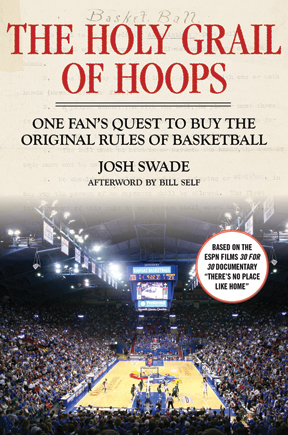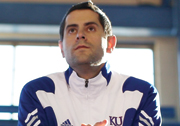 What do you do if you are a lifelong Jayhawk basketball fan and you find out the original 13 rules of basketball, penned by Dr. James Naismith — the father of modern basketball — are up for auction? If you are Josh Swade, you find a way to make sure they end up in Lawrence, Kan. At the same time you film a documentary about the experience. Finally, you write a book about it, “The Holy Grail of Hoops: One Fan’s Quest to Buy the Original Rules of Basketball.”
What do you do if you are a lifelong Jayhawk basketball fan and you find out the original 13 rules of basketball, penned by Dr. James Naismith — the father of modern basketball — are up for auction? If you are Josh Swade, you find a way to make sure they end up in Lawrence, Kan. At the same time you film a documentary about the experience. Finally, you write a book about it, “The Holy Grail of Hoops: One Fan’s Quest to Buy the Original Rules of Basketball.”
“The whole thing was an awesome experience and the book was fun to write,” Swade said.
The book should hit book shelves Aug. 1. Sprinkled throughout are names and places KU fans and Jewish Kansas Citians will recognize such as Rabbi Arthur Nemitoff and Kehilath Israel Synagogue. There’s also a cute story about Larry Brown and Swade comparing their Bar Mitzvahs.
Swade, 38, grew up in Overland Park, was a member of The Temple, Congregation B’nai Jehudah, and graduated from Blue Valley North High School in 1993. His parents, Mark and Rhonda Swade (who now reside in Monterrey, Calif.) were high school sweethearts and both graduated from the University of Kansas. Thus Swade grew up a KU fan and set off for Mount Oread in the fall of 1993.
After only one year in Lawrence, an internship took Swade to New York where he has lived ever since. While he doesn’t have a degree from KU — he graduated from Baruch College — his heart is still there, at least in Allen Fieldhouse. That’s why he got so excited when he learned that Naismith’s original rules, written in 1891, would be auctioned off by Sotheby’s in New York City on Dec. 10, 2010. Upon hearing the news that Naismith’s grandson, Ian Naismith, had offered the rules for auction, Swade could not accept the notion that this sacred document could reside with just some stranger or in a random home or hall. He resolved to ensure that the rules be returned to Naismith’s spiritual home of 40 years, the University of Kansas. There was only one issue.
He did not have $4.3 million.
Spanning the course of 39 frantic days, Swade embarked on a fanatical journey that would take him across the country. His nearly religious obsession brought him face-to-face with NBA players Paul Peirce and Steve Nash, NBA greats Jerry West and Larry Brown, and many others who knew the importance of this relic. With multiple hurdles ahead of him, the book chronicle’s Swade’s efforts to find the money and support to purchase the rules. Along the way he met David Booth, who purchased the rules for $4.38 million, setting a new record for the highest price of sports memorabilia ever sold.
Booth plans to have the original two-page document displayed at KU in a $18 million facility the university plans to build that will connect to Allen Fieldhouse. The new building will be known as the DeBruce Center in honor of Paul and Katherine DeBruce, who donated the bulk of the building’s private funding.
Before Swade wrote the book, the production company he works for, Maggie Vision Productions, completed the documentary “30 for 30: There’s No Place Like Home.” It aired on ESPN last October and can now be viewed via Netflix. The documentary itself, which Swade directed, has gotten mixed reviews on Netflix. This reviewer liked it:
“Josh Swade shows how sometimes fans can take fanaticism to a whole other level. Yes if you don’t follow college basketball or you hate the Kansas Jayhawks you probably won’t enjoy this ‘30 for 30’ as much, but it is a cool movie following a fan who wants to make sure that this treasure of sports ends up in what he believes to be its rightful place.”
The basketball fanatic that he is, Swade is stumped by the release date of the book. To him it would make more sense for it to come out as basketball season gets underway, which is always in October. In fact this year the annual Late Night in the Phog for both KU men’s and women’s basketball is set for Friday, Oct. 4, in Allen Fieldhouse.
Despite the fact that he wasn’t able to convince his Sports Publishing Group to move the book’s release date, Swade is still thrilled he got it published and chose to write it because the documentary is only an hour long.
 “There was a whole lot more that wasn’t told in the documentary that would be great for a book. It seemed like a challenge and I’m always one to like a challenge,” Swade said. It took about six months to write the book after the documentary was completed.
“There was a whole lot more that wasn’t told in the documentary that would be great for a book. It seemed like a challenge and I’m always one to like a challenge,” Swade said. It took about six months to write the book after the documentary was completed.
He said even before the documentary aired, there was a “ton of interest” in a possible book.
“Some people felt that the best way to release the book would be in unison with the film. The film was on ESPN but once I told them I had to finish the film there were still a handful of people interested in publishing the book. At that point I wanted to go with the one that would allow me to write the book the way I wanted to write it” he said.
Even though the book is specifically about the rules and KU basketball, Swade thinks the story itself is universal because it’s about excessive fandom.
“I think people, regardless of the team they are obsessed with, can relate to that. I do think there is universal appeal in that respect. It also is about a journey, a mission,” Swade said.
“I’m also a realist and I realize that people are inundated with content and people don’t have a lot of time anymore. So I think at the end of the day it will be Kansas fans who are most interested in this,” he continued.
He said it’s hard to pick just one thing he enjoyed the most about his quest to get Naismith’s original rules of basketball back to Kansas.
“Winning the auction is the obvious answer. It was so exciting to be in the room with David when all that happened, it was like when KU won the national championship,” Swade said.
The journey gave him the opportunity to meet a lot of people, such as coaches and players that he has looked up to over the years.
“That’s been unbelievable. So has been getting to meet fans,” he said.
What will Swade tell his grandkids about the project when he’s old and grey?
“The thing that fueled it in the first place. James Naismith is a huge part of KU basketball history. He started the basketball program there. With these rules coming to KU, I think in a lot of ways that cements his legacy there. He’s buried there and KU plays on James Naismith Court on Naismith Drive. Having the rules I think is the perfect finishing element. In 30 or 40 years I’ll just tell my grandkids I played a part in that, and that’s pretty cool. The credit obviously goes to David Booth. I still can’t really believe he did that. Knowing that I played a part in that is something that I’ll cherish.”



